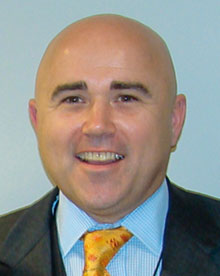
Questions, questions, questions
Crozier and Law offer some answers

Since the beginning of April, legal experts Doug Crozier and Tim Law of Heifetz Crozier Law have been responding to readers’ questions weekly on Baxter Media’s www.travelpress.com website and in its daily newsletter, Press Today.
The feature was launched to help agents with legal questions and concerns arising from COVID-19.

Crozier
To date, Crozier and Law have fielded questions on whether provincial compensation funds would cover supplier defaults due to COVID-19; tax issues; how to advise a client who asks if it’s safe to travel; and lots, lots more.
So, here’s a selection of some of the questions and some of the answers:
Q: If a supplier of travel services goes into default because of COVID-19, would consumers who reside in Quebec, Ontario and British Columbia be covered under their provincial plans (OPC, TICO or the BC Travel Compensation Fund) so long as the defaulting supplier had paid into the applicable fund and the consumer had booked with a travel agency/professional also associated with these compensation funds?
A: The province of residence of the purchaser of travel services is irrelevant. What matters is whether the consumer purchased travel services through a business licensed in one of the three provinces.
If the travel services were purchased through a travel agency – or wholesaler in BC – licensed in one of the three provinces, the purchaser is qualified to make a claim, subject to the requirements of the Fund in each province.
When applying for reimbursement from one of the funds, the purchaser will be required to prove that he or she has tried to obtain the funds from any credit card used to buy the travel services, any available insurance and “other available sources.”
Not all suppliers of travel services — and no end suppliers — pay into the funds in the three provinces and consequently not all defaults/failures of travel suppliers are covered by these funds.

Law
For example, even if the claim for reimbursement is made for travel services purchased from a licensed Ontario travel agency it will not succeed if the “default” was a bankruptcy or cessation of business of an end supplier that was not a cruise line or airline.
The fact that the default/failure of all other end suppliers is not covered is consistent with the obligation of the travel agent to exercise care when choosing end suppliers whose travel services are to be sold to customers.
Q: Increasingly, our leisure customers are asking whether we think it’s now safe to travel. What should we tell them?
A: It’s not your place to tell anyone whether or not it’s safe to travel. You may be a TRAVEL expert, but that doesn’t make you a MEDICAL expert. You won’t know their underlying medical condition, or any of the other variables (other than perhaps their age) that ought to be taken into account when that person has to make a personal decision as to when his/her travelling will resume.
That risk assessment is his/hers to make, not yours. Nicely, but firmly, refuse to give a Yes/No answer to that question.
However, this doesn’t preclude you from being helpful. Your customer with the itchy foot can be referred to sources that are more qualified to respond than you are, through which to self-educate. In addition to the principal sites such as https://www.canada.ca/en/public-health/services/diseases/2019-novel-coronavirus-infection/latest-travel-health-advice.html and https://caen-keepexploring.canada.travel/covid-19-traveller-guidance, there are industry-related sites that could be referenced. The Hotel Association of Canada has adopted the COVID-related guidelines issued by its US counterpart (AHLA); see https://www.ahla.com/sites/default/files/SafeStay_Guide.pdf. If your customer is looking at a hotel stay, s/he can contact the hotels in question, and cross-examine them on how closely they conform to the guidelines.
The National Airlines Council of Canada (NACC) hasn’t issued a similar document, regarding the criteria its member carriers ought to follow in dealing with COVID-19, or how a flyer can decide how well a particular carrier is dealing with the virus. But IATA has; see https://www.iata.org/contentassets/f1163430bba94512a583eb6d6b24aa56/covid-medical-evidence-for-strategies-200525.pdf and the various links found there. IATA’s website also links to the World Health Organization’s resource on air travel, at https://apps.who.int/iris/bitstream/handle/10665/331488/WHO-2019-nCoV-Aviation-2020.1-eng.pdf.
The WHO’s document on COVID and the accommodation sector is at https://apps.who.int/iris/bitstream/handle/10665/331937/WHO-2019-nCoV-Hotels-2020.2-eng.pdf.
TIAC has daily updates with links to potentially relevant resources, at https://tiac-aitc.ca/. And at https://www.istm.org/, the International Society of Travel Medicine offers links to more information for your customer to consider.
The recently-formed Canadian Tourism Roundtable may in the days ahead come up with practical guidelines that can be used by customers as they make a decision that you, as their travel advisor, should not. Part of being a professional is knowing the limits of your expertise, and not trying to exceed those boundaries.
Q: One of our larger corporate accounts has asked us for guidance on what it ought to do about the staff travel part of its business, as things ramp back up. Can you help us to answer the client’s question?
A: Many of these points were relevant pre-COVID, but something like this will at least give you a framework for your response to your corporate client:
- Decide what your corporate policy will be on post-travel quarantine by staff, and let us know what it is, so that we can help to honour it.
- Decide who within the Company will enforce that policy (and authorize exceptions???) and let us know, so that we can liaise with him/her.
- Review in detail the entirety of the Company’s Travel Policy, with an eye to the COVID experience and its lessons, in order to identify possible changes to it.
- Review your existing insurance coverage for staff when travelling on business, and decide if it already covers pandemic-related claims.
- If not (and even if it does) decide if you need to revisit the existing coverage with an insurance specialist.
- Regardless, figure out how the Company’s insurance policy fits with each employee’s personal coverage (if applicable), and the province’s Workers Compensation rules.
- To what extent can we, as your TMC, assist in this?
- Advise us if any of the above might impact our contract with you, so that we can together discuss the impact on our relationship.
Each Wednesday, Crozier and Law’s responses to legal questions from agents and others in the industry on Press Today. So, if you have a question, you can contact Crozier or Law at [email protected] or connect with Bob Mowat at Canadian Travel Press/Baxter Media at [email protected].
Heifetz, Crozier, Law is a Toronto law firm that has for years represented all aspects of the Canadian travel industry. The lawyers at HCL also maintain a non-travel practice, covering litigation, real estate, Wills, corporate/commercial matters, etc. To contact HCL, e-mail [email protected].
